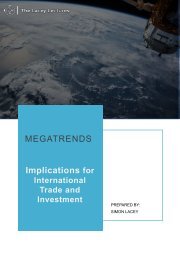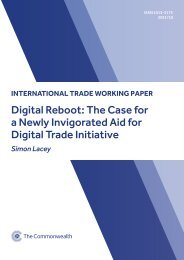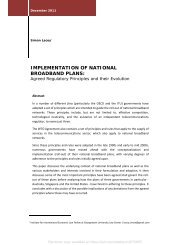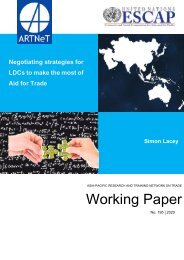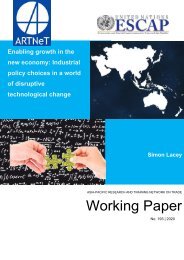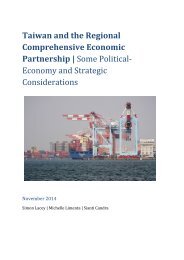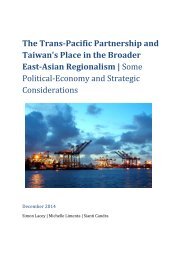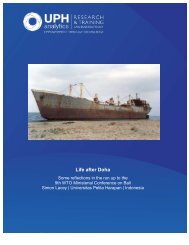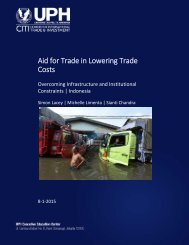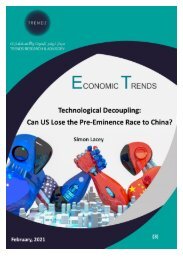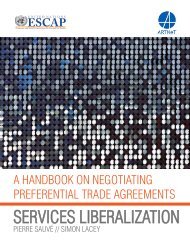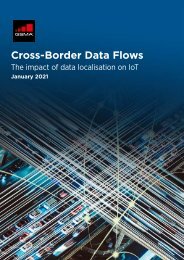White Paper Trade Rules and the Digital Economy Key Points and Findings
This synopsis document summarizes and articulates the key points and findings from the much longer 2017 White Paper on Trade Rules for the Digital Economy.
This synopsis document summarizes and articulates the key points and findings from the much longer 2017 White Paper on Trade Rules for the Digital Economy.
- No tags were found...
Create successful ePaper yourself
Turn your PDF publications into a flip-book with our unique Google optimized e-Paper software.
Chapter Six | <strong>Findings</strong> <strong>and</strong> Conclusions<br />
1 Huawei’s thought leadership is timely<br />
Even before <strong>the</strong> fate of <strong>the</strong> TPP became questionable, <strong>the</strong> timeliness of <strong>the</strong> present <strong>White</strong> <strong>Paper</strong> was never<br />
in any doubt. <strong>Trade</strong> rules specifically designed for <strong>the</strong> digital economy have been taking shape since 1998<br />
(<strong>the</strong> year of <strong>the</strong> WTO’s Work Program on Electronic Commerce). But it has only been in <strong>the</strong> last six years<br />
or so that regulatory interventions by policymakers outside of <strong>the</strong> United States have seen internet<br />
companies mobilize in an effort to directly bring about a set of targeted negotiated outcomes on issues<br />
such as <strong>the</strong> free flow of information, data localization <strong>and</strong> m<strong>and</strong>atory disclosure of source code. These<br />
efforts although stalled in for a such as <strong>the</strong> TPP <strong>and</strong> TiSA, are never<strong>the</strong>less likely to come to fruition at some<br />
point in <strong>the</strong> next few years, perhaps at <strong>the</strong> WTO, or in RCEP, or in <strong>the</strong> context of future bilateral agreements.<br />
The consensus on where <strong>the</strong> balance lies between internet freedom <strong>and</strong> regulatory autonomy now seems<br />
to be up for grabs all over again.<br />
2 The new trade rules will impact Huawei’s interests<br />
Ever since before <strong>the</strong> conclusion of <strong>the</strong> Information Technology Agreement (1997) <strong>and</strong> <strong>the</strong> elucidation of<br />
<strong>the</strong> above‐mentioned WTO Work Program on Electronic Commerce (1998), <strong>and</strong> particularly as negotiations<br />
began in earnest on <strong>the</strong> TPP (starting in 2010), <strong>the</strong> global ICT industry <strong>and</strong> internet companies have been<br />
working hard to achieve binding <strong>and</strong> enforceable trade rules that would maximize <strong>the</strong> industry’s freedom<br />
of action, underpin transparency <strong>and</strong> predictability, <strong>and</strong> reduce both trade barriers <strong>and</strong> trade costs for<br />
<strong>the</strong>m. These efforts have culminated in a number of early successes (<strong>the</strong> ITA itself), <strong>and</strong> ongoing trade <strong>and</strong><br />
investment liberalization in <strong>the</strong> form of various FTAs. As part of <strong>the</strong> global ICT industry <strong>and</strong> as a company<br />
that does business in some 170 countries, Huawei’s interests are of course affected in positive ways by<br />
<strong>the</strong>se developments. But <strong>the</strong> enactment of new rules which have <strong>the</strong> potential to alter <strong>the</strong> underlying<br />
environmental conditions in which <strong>the</strong> global ICT industry operates must be carefully studied by a company<br />
<strong>the</strong> size of Huawei. Our <strong>White</strong> <strong>Paper</strong> on <strong>the</strong> new trade rules being negotiated for <strong>the</strong> digital economy has<br />
made an initial attempt to do just that. We have found for example, that our Carrier Network business is<br />
likely to benefit from fur<strong>the</strong>r tariff reduction or zero‐duty commitments negotiated <strong>and</strong> being<br />
implemented now under <strong>the</strong> ITA Expansion initiative at <strong>the</strong> WTO. We also predict that negotiations on nontariff<br />
barriers being contemplated as part of <strong>the</strong> ITA Expansion work could be of great benefit to us in future,<br />
particularly on issues like conformity assessment procedures <strong>and</strong> electromagnetic compatibility.<br />
3 Huawei should be part of <strong>the</strong> conversation<br />
Because we at Huawei operate across such a broad swa<strong>the</strong> of <strong>the</strong> digital economy <strong>and</strong> are now an<br />
undisputed industry leader in network equipment <strong>and</strong> devices, we need to make our voice heard, ei<strong>the</strong>r<br />
directly or indirectly, loudly or softly, but we should not remain silent. This is even more so <strong>the</strong> case now<br />
that leadership on <strong>the</strong> negotiation of mega‐regional trade negotiations has shifted from <strong>the</strong> TPP to RCEP.<br />
As a Chinese multinational, Huawei is uniquely placed to contribute to <strong>the</strong> conversation in <strong>the</strong> next few<br />
years. Our <strong>White</strong> <strong>Paper</strong> represents a first milestone in this direction. The previous set of initiatives launched<br />
in an effort to write new rules for <strong>the</strong> digital economy (TPP, TiSA, <strong>and</strong> TTIP) was to a very large extent<br />
influenced by a narrow set of industry players <strong>and</strong> government actors. With <strong>the</strong> finalization <strong>and</strong> ratification<br />
of <strong>the</strong>se initiatives now in doubt, this represents a unique moment in history for o<strong>the</strong>r voices to be heard<br />
<strong>and</strong> to become part of <strong>the</strong> conversation. Even if our views <strong>and</strong> perspectives may not differ radically from<br />
those expressed by o<strong>the</strong>r actors in <strong>the</strong> digital economy, it is still important that our voice be heard.<br />
20




